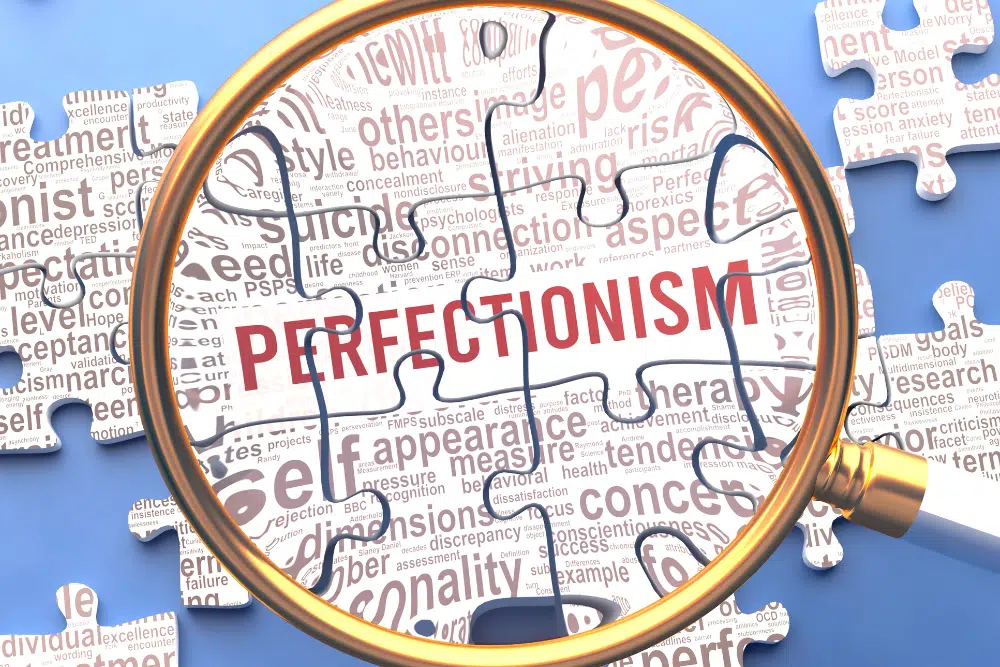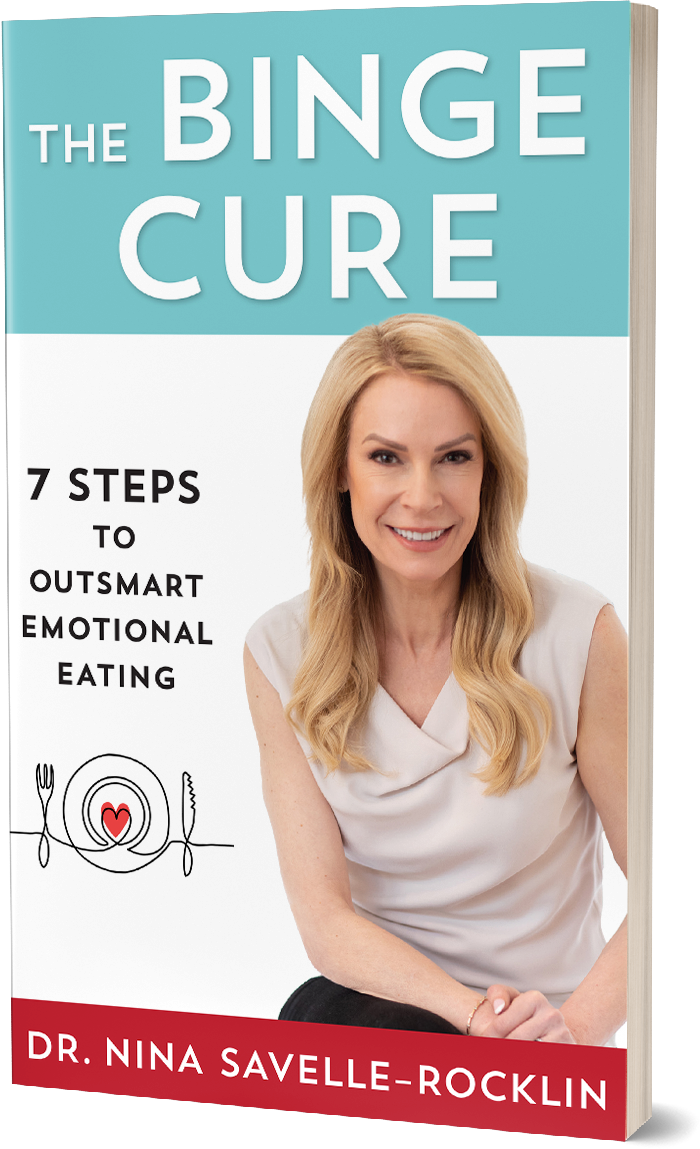Dr. Nina Savelle-Rocklin
Breaking the Cycle of Perfectionism and Binge Eating Disorder
Table of Contents
- What is perfectionism?
- Signs of Perfectionism
- Casey’s Story
- Overcoming Perfectionism in Binge Eating
- The Myth of Eating Perfectly
- The Myth of the Perfect Body
- Embracing Imperfections
- Rewriting the Perfectionist Narrative
- Embracing Imperfection: Learning to Accept Yourself Unconditionally
- The Power of Imperfection
- Understanding the Link Between Perfectionism and Binge Eating Disorder
- Letting Go of Perfection: Accepting Imperfection during Life Transitions and in Relationship with Food
- How Perfectionism Can Lead to Binge Eating
- Frequently Asked Questions:

Do you strive to be flawless, set extremely high standards for yourself, and often criticize yourself?
If the answer is yes, maybe you’re a perfectionist.
Perfectionism is that constant drive to be flawless and avoid failure at all costs. It creates impossibly high standards which leads to harsh self-criticism when we inevitably fall short (as all humans do).
For those who struggle with issues like binge eating, perfectionism can add fuel to the fire. The extreme focus on perfecting our eating, our bodies, and our performance feeds into the black-and-white, all-or-nothing thinking that drives those binge and restrict cycles.
Perfectionism and binge eating go hand-in-hand. Perfectionistic traits – like self-criticism, need for control, and fear of failure – can actually drive our disordered eating behaviors.
The path to overcoming binge eating means identifying and managing those perfectionistic attitudes that pop up. With more self-compassion, flexibility, and self-awareness, we can break free from perfectionism and heal our relationship with food.
What is perfectionism?
Perfectionism is a trait that involves a relentless pursuit of perfection and an intense fear of making mistakes or falling short of expectations.
Perfectionists often have an all-or-nothing mindset, believing that anything less than perfect is a failure. This mindset can manifest in various ways, including excessive self-criticism, a constant need for approval, and an intense focus on details and order.
In binge eating disorder, perfectionism can manifest in several ways. People with binge eating disorder may have rigid rules and restrictions around food, such as only allowing themselves to eat certain foods.
Rules like, “I shouldn’t eat bread (or carbs)” or, “I never eat sugar” or, “I don’t eat anything in a wrapper,” are examples of this kind of thinking.
They may also have strict guidelines for portion sizes and calorie intake. These rules can create a sense of control and order, but they can also lead to feelings of guilt, shame, and failure when they are inevitably broken.
If you stop eating perfectly you might think you’ve “blown it” and “the day is ruined” so you might as well eat everything you’ve been denying yourself.
Perfectionism can also extend beyond food and into other areas of life. People struggling with binge eating disorder often feel the need to excel in all aspects of their lives, whether it’s their careers, relationships, or appearance.
They may constantly compare themselves to others and feel inadequate if they perceive themselves as falling short. This constant striving for perfection can be exhausting and overwhelming, contributing to feelings of stress and anxiety.
This intolerance of mistakes can also extend to relationships with others. Perfectionists may have unrealistic expectations of how other people should behave or perform, and they may become frustrated or disappointed when those expectations are not met. This can strain relationships and create a sense of dissatisfaction or dissatisfaction with others.
When relationships are disappointing we often feel lonely or empty, which is then resolved with food, which symbolically fills the void.
Challenging and changing perfectionistic tendencies ultimately leads to a healthier and more balanced relationship with food and yourself.
Signs of Perfectionism
What are some signs of perfectionism? Here are just a few:
- Black and white thinking and difficulty dealing with moderation – Your mind goes straight to extremes. You don’t know how to just eat reasonably – it’s all or nothing!
- Harsh inner critic and intense self-scrutiny – That voice in your head that’s always judging you super critically over every little thing.
- Feeling like a failure after minor setbacks – One tiny slip up and you’re convinced you’ve failed completely, leading to shame.
- Bingeing when perfection seems impossible. You try to rigidly control food which only leads to bingeing once your willpower inevitably fails. And the cycle continues.
Perfectionism can be sneaky, but having awareness is power. Now we can catch it, challenge it, and choose a unique response.
Casey’s Story
Casey, a marketing director for a large corporation, struggled with binge eating for decades. Casey put intense pressure on herself to excel at work, have the perfect home, and maintain strict exercise and diet standards.
She had little tolerance for mistakes – especially her own – and was highly self-critical when she fell short of those expectations.
As a result, Casey was constantly stressed and anxious. When an advertising campaign she led didn’t gain as much traction as hoped, she agonized for weeks over what she did wrong. She handled disappointment by working even harder, skipping meals, and cutting calories to stay disciplined.
Ultimately, the deprivation led Casey to crack under the pressure. She ended up bingeing on junk food, eating until she felt physically ill. Of course, this caused her to intensify her perfectionistic tendencies to overcompensate and went on a restrictive diet, which led to another binge, and the cycle continued.
Casey finally was ready for a diet-free approach to stop binge eating. At first, it was difficult for her to be kinder to herself since she believed her harsh slave-driving attitude was motivational.
She thought if she wasn’t hard on herself, she’d be lazy and never get anything done. By challenging this belief and learning self-compassion techniques, she began to be less judgemental toward herself.
She slowly started handling perceived failures in a balanced way. She also learned healthier ways to manage work stress, opening up to friends for support rather than isolating herself.
Casey challenged her black-and-white thinking and embraced moderation and self-acceptance regarding food, exercise, and other aspects of her life. She started encouraging herself more and bingeing less.
She still has moments of falling into old patterns, but she’s making progress. She realizes it’s okay to be perfectly imperfect.
Overcoming Perfectionism in Binge Eating
When it comes to overcoming perfectionism in binge eating, it’s important we understand where those unrelenting high standards come from in the first place.
Perfectionism often stems from a deep fear of failure or a desire for control. We think we need to be flawless to be accepted or to keep our lives in order. Challenging those beliefs involves asking ourselves questions like:
- Why am I so afraid of messing up?
- Why do I feel like I need to control every aspect of eating?
- Where did I get the message mistakes aren’t allowed?
- Where’s the wiggle room?
Once we understand the roots of perfectionism, we can pull them out and make room for self-acceptance.
Challenge perfectionistic beliefs: Perfectionistic beliefs often revolve around rigid standards and an all-or-nothing mentality. It is essential to challenge these beliefs by questioning their validity and considering more flexible and realistic alternatives. For example, instead of striving for a perfect body, focus on overall health and well-being.
A ‘good enough’ mentality is key in this process. Understand that it’s okay not to get everything right all the time. Eating a balanced diet and maintaining a healthy lifestyle doesn’t mean every meal should be flawless.
We all have days when we might indulge a little more, and that’s perfectly fine. It does not signify failure. Instead, it’s a sign that we’re human – flexible, adaptive, and capable of change.
Practice self-compassion: Perfectionism often involves harsh self-criticism and a lack of self-acceptance. Developing self-compassion is crucial in overcoming perfectionism in binge eating. Treat yourself with kindness and understanding, acknowledging that nobody is perfect and that making mistakes is a natural part of life.
One way to foster self-compassion is by replacing self-critical thoughts with more affirming messages. Instead of beating yourself up, remind yourself of the progress you’ve made, your inherent worth as a person, and that setbacks are just stepping stones.
Set more realistic goals: Perfectionism often leads to setting unattainable goals, which can contribute to feelings of failure and trigger binge eating episodes. Setting realistic and achievable goals allows for a sense of progress and accomplishment, reducing the need for perfectionism.
For instance, instead of aiming to lose a specific amount of weight, target smaller ones, such as incorporating more vegetables into your daily diet or starting regular moderate exercise. You might decide to prioritize getting more sleep, reducing stress, or making time to prepare home-cooked meals. These smaller, sustainable changes can lead to significant progress in the long run.
By setting these achievable goals, you take the overwhelming obsession out of being perfect and instead focus on simply being better than you were yesterday.
Remember, it’s not about being the best – it’s about being better. One day at a time, one meal at a time, you create a healthier relationship with food and with yourself. And it doesn’t need to be a radical, all-or-nothing shift. Small, incremental changes can lead to significant results over time.
For instance, if you tend to binge when you’re stressed or overwhelmed, identify what you mean by “stressed” or “overwhelmed.” Those terms are umbrella words for specific emotions like anxiety, anger, or loneliness. Recognizing these underlying emotions gives you crucial insights into your triggers, providing a solid basis for tackling your binge eating from a psychological perspective.
Celebrate small victories: Perfectionism tends to focus on what goes wrong rather than what goes right. Celebrating small victories, such as making healthier food choices or engaging in self-care activities, can help shift the focus towards positive aspects and reinforce progress.
Change does not happen overnight. Creating a healthier relationship with food is a journey, not a destination. Recognizing your progress, no matter how small, is part of dismantling the all-or-nothing thinking that characterizes perfectionism.
By shifting your perspective from focusing solely on the end goal to appreciating the small improvements you make each day, you can gradually diminish the pressure you put on yourself.
Accept setbacks: If you find yourself falling back into old patterns, don’t despair. Failure is not an endpoint, but an opportunity for growth and learning.
As difficult as it may be, remind yourself that you are human and that making mistakes is a natural part of life.
Beyond simply accepting mistakes, learn to view them as growth opportunities. Each setback is a chance to better understand triggers and work towards devising more effective coping strategies. Think of it as a puzzle; each piece you add brings you one step closer to seeing the complete picture.
To make this approach easier, keep a record of your progress. Writing down your successes, regardless of size, can make them more tangible and reinforce their importance. It can also be a visual reminder of your growth and persistence, particularly during difficult times.
An example of celebrating small victories could be as simple as ‘Even though I turned to food, I recognized what was eating “at” me so I can start working on ways to deal with those feelings’ or ‘I went on a walk today’.
These accomplishments may seem small, but they represent significant milestones in overcoming binge eating and perfectionism.
Overcoming perfectionism is not just about letting go of unattainable standards. It’s about creating a happier, healthier attitude toward yourself, and understanding that self-care, self-love, and self-acceptance are the most important of all.
To do that, we also have to challenge some societal and cultural myths.
The Myth of Eating Perfectly
Let’s challenge the illusion of ‘perfect eating.’ In a world where fad diets and flawless Instagram food posts are the norms, it’s easy to buy into the false narrative that there is a perfect way to eat. This ‘perfect diet’ claim often leads to an all-or-nothing mentality, amplified by the loaded label that deems certain foods as ‘good‘ or ‘bad.’
This ‘all-or-nothing’ mentality can be incredibly detrimental. Instead of promoting balance, it often fuels feelings of guilt and failure. If someone assumes a certain food is ‘bad’ and then eat it, they might experience a lot of guilt. This guilt leads to stress, sparking a cycle of binge eating as a coping mechanism.
Instead, recognize that there are no ‘perfect’ foods or ‘perfect’ diets. Instead, what truly matters is a balanced and varied diet that provides the nutrients your body needs.
An important point to understand about nutrition is it’s a deeply individual thing. What works for one person might not work for another.
The perfect meal or diet doesn’t exist because everyone’s body and nutritional needs are unique. However, this doesn’t mean you should eat without control or ignore nutritional information. It means ending the dichotomy of good and bad foods and beginning to see food for what it is: fuel for your body that is meant to be enjoyed.
An example of perfectionism is thinking, “I’ve already messed up, so I may as well keep eating.” A flexible approach would sound like, Here is one way to finish that thought:
An example of perfectionism is thinking, “I’ve already messed up, so I may as well keep eating.” A flexible approach would sound like, “One unhealthy choice won’t derail all my hard work. I can restart healthy habits at the next meal.”
Here are some other options:
“I don’t have to be perfect to make progress. I’ll refocus and make the next choice a healthy one.”
“Being rigid and beating myself up won’t help. I’ll acknowledge this binge, focus on what led to it in the first place, be kind to myself, and continue striving for balance.”
“Let me focus on why I ate that. Was I hungry, deprived, or eating for emotional reasons? “
The key is shifting from an all-or-nothing perspective to a growth mindset. Allowing some flexibility and self-compassion after a binge can prevent it from continuing, or from happening again.
Abandoning the perfectionist mentality and embrace flexibility, it becomes much easier to recover and proceed in a healthier direction after a one-off overeating episode.
Think about what small steps you can take today to reject the idea of ‘perfect eating.’ Whether it means allowing yourself a treat from time to time without guilt, reducing portion sizes gradually, or incorporating more whole foods into your diet, every step is a step towards a healthier relationship with food.
With time, these small changes can create a lasting effect on your eating habits and overall health.
Remember, overcoming perfectionism isn’t about achieving a perfect score. It’s about progress, not perfection. It’s about learning to love and accept yourself, flaws and all. After all, we’re all perfectly imperfect humans learning from our mistakes and growing every day.
The Myth of the Perfect Body
It’s virtually impossible to escape society’s pervasive and damaging beauty standards. They’re on every billboard, in every commercial, and splashed across the pages of every magazine.
But above all, they’re ingrained in our minds through cultural conditioning. These standards, which often promote an unattainable ideal of perfection, often create perfectionism, especially when it comes to food and our bodies.
Understanding and challenging these unrealistic beauty standards is crucial for overcoming perfectionism associated with binge eating disorder.
Here are some steps you can take:
- Recognize the distortion: First, it’s important to understand that these beauty standards are a construct of society and not a reflection of reality or your worth as an individual. They exist to sell products and services and are often distorted or manipulated.
- Reduce exposure: Limit the amount of media that propels these harmful narratives. If certain social media accounts or magazines make you feel “less than,” try to distance yourself from them.
- Foster body-positive relationships: Surround yourself with friends, family, and communities who promote and celebrate body diversity and self-acceptance. Their influence can help reshape your perspectives.
- Embrace the unique: Remember that real beauty is diverse and unique. There’s no one-size-fits-all when it comes to human bodies. Embrace yourself as you are.
In challenging these standards, you’re not just taking a stand against harmful societal narratives, you’re also contributing to your healing journey from perfectionism and binge eating disorder. Remember, it’s not an overnight process, but a journey of self-love, acceptance, and healing.
It’s not your job to look like the photoshopped images on the covers of magazines – it’s your job to be you. Perfectly imperfect, wonderfully unique – you.
Calling out unrealistic body standards absolutely matters, since those toxic messages affect us all. Self-acceptance doesn’t mean you can’t make healthy changes if you choose. It’s okay to want to feel and look fitter. Loving your body means listening to its wisdom, and only you know what you need to feel your best.
The key is to separate external standards from internal needs – move for wellness, not for meeting cultural ideals. You can challenge the notion that worth depends on appearance and still take steps that feel personally right for your health. Your power comes from defining beauty and happiness on your own terms.
Embracing Imperfections
Ever heard of the phrase, ‘Perfection is the enemy of good’?
Embracing imperfections can seem daunting, especially for those who have always strived for perfection, but it is a critical step in your journey toward recovery from binge eating disorder.
Self-acceptance is not about settling for less; it is about acknowledging and understanding that as humans, all of us have inherent flaws.
Our issues with food, weight, or any aspect of our lives should not define us. Dealing with these issues will always be a part of your journey, but it’s crucial not to let your imperfections hold you hostage.
Imperfections are not inadequacies; they are reminders that we’re all in this together.
— Brené Brown
Here are some ways to build self-acceptance and embrace our imperfections:
- Countering negative self-talk: If you consistently tell yourself that you need to be perfect, you’re setting yourself up for failure. Start by moving away from absolute language like “I must” or “I should” and replacing it with more compassionate language such as “I could” or “It would be nice if”. This helps to alleviate the pressure of perfection.
- Acknowledging mistakes as a part of growth: Adopting a growth mindset can aid in self-acceptance—see your mistakes as opportunities for learning and growth instead of as reasons to berate yourself.
- Celebrating small victories: Focus not just on your end goal but also on your progress along the way. This will help cultivate a sense of achievement and pride, even when things are not perfect.
- Being kind to yourself: Cultivate self-compassion. Practice self-care and take time to do things you enjoy. Being kind to yourself involves treating yourself as you would a dear friend in a similar situation.
Everyone’s journey towards self-acceptance and overcoming perfectionism is unique, and what works for one may not necessarily work for another. The crucial point to remember is that the journey towards self-acceptance is not linear and there will be ups and downs. What matters is perseverance, patience, and consistency.
Remember, it’s okay not to be perfect.
Rewriting the Perfectionist Narrative
One of the most powerful steps for overcoming perfectionism is to rewrite your narrative about yourself and food. That means changing the standards and goals that you’ve set for yourself, particularly regarding food, weight, and any aspect of your life that triggers eating episodes.
Identify the Perfectionist Voice: The first step in rewriting your narrative is identifying the perfectionist voice in your head. This is the voice that tells you, “You must always eat perfectly,” or, “You must always be thin.”
Challenge that Voice: Once you identify this voice, challenge it! Ask yourself, “Is what it’s telling me really true? Or, is it an unreasonable expectation that’s only causing me pain?”
Ask yourself if you’d hold anyone else to those standards. Would you expect your children, friends, or loved ones to always eat perfectly or be thin? You would probably never like someone less if they gained weight. Or feel a deeper connection to a person just because they lost weight.
Create a New Narrative: Now that you have identified and challenged the perfectionist voice, it’s time to replace it with a healthier narrative.
This new narrative should kind and encouraging. It’s okay if changing your thoughts feels forced at first—over time, as you practice thinking differently, it will start to feel more natural.
As you rewrite your perfectionist narrative, remember that change doesn’t happen overnight—it’s a process. Be patient with yourself and remember that you learned this way of relating to yourself, food, and your body. You can unlearn it and create a new way of thinking.
Here are some more examples of flexible thinking:
“I ate more than I planned at dinner. That’s okay, I can get back on track with my next meal.”
“This scale number is higher than I want. But my weight fluctuates daily, so I’ll focus on long-term patterns.”
“I don’t have time for my usual workout today. I’ll still fit in a quick walk to get some activity.”
“I indulged in an unplanned snack. No need to be hard on myself – I’ll add more protein and veggies at my next meal.”
“My friend is making delicious cookies. I’ll have a couple and really enjoy them.”
“This has been an emotionally exhausting week. It’s okay to rely on takeout or DoorDash more than usual.”
“I’m feeling discouraged that my jeans feel tight. Rather than give up, I’m going to encourage myself and remind myself of my strengths and capacities.”
“I ate when I wasn’t hungry today. I’m going to figure out why, rather than beat myself up.”
“I don’t have to be perfect with my diet to be healthy.”
“I wanted to work out for an hour but only had time for 20 minutes. Something is better than nothing.”
The overall mindset is compassion, moderation, and reasonableness. Allowing flexibility helps sustain motivation versus rigid all-or-nothing thinking.
Remember, the goal isn’t to eat perfectly—it’s to eat mindfully and in moderation–but also to ask yourself why you’re turning to food, rather than only focusing on food.
By doing so, you will free yourself from the shackles of perfectionism and put yourself on the path to liberation from binge eating disorder.
Perfectionism and binge eating disorder often go hand in hand, creating a vicious cycle that can be difficult to break. By recognizing the link between these two issues you can overcome them and create a healthier relationship with yourself–and therefore, with food.
Embracing Imperfection: Learning to Accept Yourself Unconditionally
Learning to accept yourself unconditionally is a crucial step towards overcoming perfectionism and binge eating disorder. It involves embracing your strengths and weaknesses, recognizing that nobody is perfect, and understanding that self-worth is not determined by external factors such as appearance or achievements.
Another important aspect of unconditional self-acceptance is letting go of the need for external validation. Recognize that your worth does not depend on what others think of you. Instead, focus on your own values, goals, and personal growth. By prioritizing your own well-being and happiness, you can cultivate a sense of self-acceptance that is independent of others’ opinions.
Finally, it is important to remember that self-acceptance is a journey, and it may not happen overnight. Be patient and kind to yourself as you navigate through the process. Celebrate small victories and acknowledge that setbacks are a natural part of growth. With time and practice, you can develop a healthier relationship with yourself and cultivate unconditional self-acceptance.
The Power of Imperfection
Our imperfections make us unique, relatable, and ultimately, more personable.
Take a look at the world around you. Not everything is perfectly symmetrical or uniform, and yet this imperfection creates diversity and adds beauty to our lives. It’s time to transpose this philosophy onto your personal self-image and relationship with food.
Your imperfections are marks of authenticity, and that is the beauty of you.
— Isaac Fowler
To step away from perfectionism and towards a healthier relationship with food, we need to celebrate imperfection.
Reframe Your Perspective: Start viewing your imperfections as your unique attributes rather than flaws.
This applies to your physical attributes, your eating habits, and your life in general. This shift in perspective will help you stop chasing after unrealistic, harmful standards.
- Practice Self-Compassion: Be gentle and understanding with yourself. Remember, everyone has flaws and makes mistakes. Treat yourself with the same kindness and compassion you would show to a friend.
- Challenge Perfectionist Thoughts: Catch yourself when you’re thinking in an all-or-nothing, perfectionistic way. Challenge these thoughts and replace them with more balanced ones.
- Focus on Progress, Not Perfection: Instead of obsessing over a perfect ideal, celebrate every small step you make towards healthy eating and self-acceptance. Every step, no matter how small, is progress.
In the end, the power of imperfection lies in the acceptance of one’s self, just the way we are. This acceptance plays a critical role in overcoming binge eating disorder, allowing you to make peace with food, and celebrate the most authentically beautiful version of yourself – flaws, imperfections and all.
Embracing imperfection is liberating. It gives you the freedom and courage to be your authentic self, flaws and all. By letting go of perfection, you open yourself to the beauty of being perfectly imperfect. And in this journey, you learn to rewrite your narrative around food and weight, paving the path towards a healthier, happier you.
We must remember that there’s more to life than living up to unrealistic ideals. It’s about finding joy, fulfillment, and peace within ourselves. Imperfections make us unique, and in this imperfection lies the true essence of our being – open, vulnerable, and genuinely interesting. So, let’s celebrate our flaws, for they are what make us distinct.
Finding self-acceptance is a crucial step in embracing imperfections. It involves recognizing that no one is perfect and that striving for perfection is not only unrealistic but also detrimental to our well-being. By accepting our imperfections, we can free ourselves from the constant pressure to be flawless and instead focus on self-improvement and personal growth. This shift in mindset allows us to develop a healthier relationship with ourselves and others, fostering self-compassion and understanding.
One way to embrace imperfections is by challenging our negative self-talk and unrealistic expectations. Often, our inner critic magnifies our flaws and sets unattainable standards. By questioning these thoughts and reframing them in a more realistic and compassionate way, we can begin to see ourselves in a more positive light.
This process involves acknowledging our strengths and achievements, as well as accepting our limitations and mistakes. It is important to remember that imperfections are a natural part of being human and do not define our worth or value.
Another helpful strategy in embracing imperfections is practicing self-compassion. Perfectionists tend to be overly critical of themselves, which can lead to feelings of shame and guilt after a binge episode. By practicing self-compassion and treating oneself with kindness and understanding, individuals can break free from the cycle of self-destructive behaviors and develop a more positive and nurturing relationship with themselves.
This involves treating ourselves with kindness, understanding, and patience, especially when we make mistakes or fall short of our own expectations. Instead of berating ourselves for our imperfections, we can offer ourselves the same empathy and support we would give to a loved one. Self-compassion allows us to cultivate a sense of unconditional self-worth and fosters resilience in the face of setbacks or failures.
Additionally, surrounding ourselves with a supportive and accepting social network can greatly contribute to our journey of embracing imperfections. Connecting with others who understand and appreciate us for who we are, flaws and all, can help us feel validated and accepted. It is important to seek out relationships that promote self-acceptance and avoid those that perpetuate unrealistic standards or judgment. By building a network of understanding and compassionate individuals, we can create an environment that encourages self-acceptance and growth.
Last, embracing imperfections requires a shift in our mindset towards a growth-oriented perspective. Instead of viewing mistakes or failures as signs of inadequacy, we can see them as opportunities for learning and personal development. Embracing imperfections means embracing the journey of self-improvement and understanding that progress is more important than perfection. By adopting a growth mindset, we can approach challenges with resilience and perseverance, knowing that setbacks are an inherent part of the process.
Finding self-acceptance and embracing imperfections is a transformative journey that allows us to let go of perfectionism and live a more fulfilling life. By challenging negative self-talk, practicing self-compassion, cultivating a supportive social network, and adopting a growth mindset, we can develop a healthier relationship with ourselves and others. Embracing imperfections is not about settling for mediocrity, but rather about embracing our authentic selves and striving for personal growth without the burden of unrealistic expectations.
Understanding the Link Between Perfectionism and Binge Eating Disorder
Perfectionism and binge eating disorder are often interconnected, with perfectionistic tendencies playing a significant role in the development and maintenance of the disorder. Perfectionism refers to the relentless pursuit of flawlessness and high standards, often accompanied by critical self-evaluation.
Individuals with binge eating disorder may exhibit perfectionistic traits, such as rigid rules around food and weight, an intense fear of failure, and a strong need for control. These perfectionistic tendencies can contribute to the cycle of binge eating, as individuals may turn to food as a way to cope with the pressure to meet unrealistic standards or to alleviate feelings of failure or inadequacy.
Perfectionism can create a vicious cycle in individuals with binge eating disorder. The pressure to be perfect can lead to strict dieting or restrictive eating patterns, which can trigger episodes of binge eating. After a binge episode, individuals may experience intense guilt, shame, and self-criticism, which further fuels the perfectionistic mindset. This perpetuates the cycle, as individuals may resort to more rigid rules and extreme measures to regain control over their eating, only to find themselves caught in another binge episode. The constant striving for perfection and the subsequent failure to meet these unattainable standards can contribute to feelings of distress and exacerbate the binge eating behavior.
Perfectionism can also impact body image dissatisfaction in individuals with binge eating disorder. The relentless pursuit an ideal body image can lead to body dissatisfaction, regardless of actual weight or appearance. This dissatisfaction can contribute to negative body image beliefs, such as feeling fat or unattractive, which may trigger binge eating episodes as a way to cope with these negative emotions. The cycle of binge eating and subsequent negative body image can further reinforce perfectionistic tendencies, as individuals may become even more focused on controlling their eating and appearance in an attempt to achieve the desired level of perfection.
Furthermore, perfectionism can impact the recovery process for individuals with binge eating disorder. The fear of making mistakes or not meeting high standards can create a barrier to seeking help and engaging in treatment. Perfectionistic tendencies can also make it challenging for individuals to accept and embrace the imperfect nature of the recovery journey. Overcoming perfectionism is essential in creating a more compassionate and forgiving mindset, which can facilitate progress and healing in the recovery process.
In conclusion, understanding the link between perfectionism and binge eating disorder is crucial in helping individuals struggling with the. By recognizing and addressing perfectionistic tendencies, individuals can begin to break the harmful cycle of binge eating and develop a healthier relationship with food, weight, and themselves. It is important to provide support, education, and resources to help individuals overcome perfectionism and cultivate self-acceptance and self-compassion.
Letting Go of Perfection: Accepting Imperfection during Life Transitions and in Relationship with Food
Are you a perfectionist? As hard as it is to accept, there’s no such thing as the perfect life, the perfect body, the perfect job, the perfect way to eat, or the perfect way to be in the world. Accepting imperfection means acknowledging that it is okay not to have everything figured out or to make mistakes along the way.
This mindset can be particularly helpful when it comes to our relationship with food. Accepting imperfection means understanding that it is okay to have moments of overeating or indulging in comfort foods during life transitions.
It is important to be kind to ourselves and not beat ourselves up over these moments. By accepting imperfection, we can let go of guilt and shame associated with our eating behaviors and instead focus on finding healthier coping mechanisms.
One way to practice accepting imperfection is to cultivate self-compassion. Self-compassion involves treating ourselves with kindness and understanding, especially during challenging times.
Instead of criticizing ourselves for overeating or making unhealthy food choices, we can offer ourselves compassion and understanding. This allows us to approach our relationship with food from a place of self-care rather than self-judgment.
Another important aspect of accepting imperfection is letting go of the need for control. During life transitions, we may want to control every aspect of our lives, including our eating habits.
This can often lead to rigid and restrictive behaviors around food. By accepting imperfection, we can let go of the need for control and instead focus on finding balance and flexibility in our eating patterns.
Otherwise, we are vulnerable to displacing our lack of control from our life situation onto food.
Accepting imperfection during life transitions and in our relationship with food is crucial for our overall well-being. It allows us to be kinder to ourselves, cultivate self-compassion, and let go of the need for control. By embracing imperfection, we can discover healthier ways to cope, and when we do that, we stop using food to cope.
How Perfectionism Can Lead to Binge Eating
Since perfectionists tend to be rigid and intolerant of mistakes, any deviation from their ideal can be seen as a failure or a mistake, which can lead to feelings of disappointment, frustration, and self-criticism. This leads to binge eating for comfort and distraction.
In the context of binge eating disorder, perfectionism can manifest in a number of ways. Perfectionists may have strict rules or guidelines around food and body image, and any deviation from these rules can be seen as a failure. This can lead to feelings of guilt, shame, and turning to food for comfort and distracting.
It is important for people struggling with binge eating disorder to recognize the role that perfectionism plays in their relationship with food and their overall well-being. By challenging perfectionistic thinking and adopting a more flexible and self-compassionate mindset, you can begin to break free from the cycle of binge eating and perfectionism.
Frequently Asked Questions:
How does perfectionism contribute to the development of binge eating disorder?
Perfectionism can contribute to binge eating disorder (BED) by creating a persistent sense of failure and inadequacy. Individuals with perfectionistic tendencies often set unrealistically high standards for themselves. When they inevitably fail to meet these standards, they may experience intense self-criticism and negative emotions. Binge eating can become a way to temporarily alleviate these feelings of inadequacy and distress. However, the relief provided by food is short-lived, and it’s often followed by feelings of guilt and shame, which reinforce the cycle.
Can binge eating be a response to the rigid control imposed by perfectionism?
Yes, binge eating can be a response to the excessive control and rigid rules that individuals with perfectionism impose on themselves. When individuals with perfectionistic behaviors relentlessly control their diet and exercise regimens to achieve a perfect body or perfect health, they may become overwhelmed and succumb to binge eating as a counter-reaction to this strictness. The all-or-nothing thinking associated with perfectionism means that any small dietary “slip” can lead to an “I’ve already ruined it” mentality, leading to overeating.
What are some common signs that someone is struggling with both perfectionism and binge eating disorder?
Some common signs include an overemphasis on flawless performance in areas like work or academics, coupled with episodes of eating large amounts of food in a short time (often in secret) followed by shame or guilt. There might also be a pattern of strict dieting or exercise followed by periods of loss of control over eating. Physical signs could include weight fluctuations, while emotional signs may involve heightened sensitivity to criticism, a fear of failure, and an unhealthy preoccupation with body image.
How does one break the cycle of perfectionism and binge eating disorder?
- Seeking professional help: A therapist can assist in developing healthier coping mechanisms.
- Practicing self-compassion: Learning to be kind to oneself and accepting that everyone makes mistakes can alleviate the self-imposed pressure.
- Challenging perfectionist thoughts: Replacing critical thoughts with more balanced and realistic ones can reduce the urge to binge.
- Building a support system: Sharing struggles with trusted friends or support groups can provide emotional support and accountability
What role does societal pressure to be perfect play in binge eating disorder?
Societal pressures to adhere to an ideal body type or to present a perfect lifestyle, often amplified by social media, can exacerbate feelings of inadequacy and anxiety. These pressures can make individuals more prone to engaging in cycles of extreme control and subsequent binge eating as a way to cope with the stress of trying to live up to these perceived societal standards.
How can friends and family support a loved one who is dealing with perfectionism and binge eating disorder?
Friends and family can be crucial in the recovery process by providing emotional support without judgment. They can encourage their loved one to seek professional help, be patient and understanding, avoid making comments about weight or appearance, listen empathetically, and educate themselves about the disorders. It’s also helpful to engage in activities together that aren’t related to food or appearance, to help the individual build a healthier self-image and reduce stress.
Can perfectionism and binge eating disorder have long-term health implications if not addressed?
If left unaddressed, the combination of perfectionism and BED can lead to serious physical and psychological consequences. Physically, the cycle of binge eating can result in weight gain, nutritional deficiencies, and increased risk for conditions like heart disease, type 2 diabetes, and gastrointestinal issues. Psychologically, the chronic stress and emotional turmoil associated with perfectionism and BED can increase the risk for anxiety disorders, depression, and lowered self-esteem, which can impact many aspects of an individual’s life.
Ready to transform your relationship with food?
Join Dr. Nina's newsletter and receive:
• Expert tips on overcoming emotional eating
• Strategies for sustainable weight loss
• Exclusive content not found anywhere else
Don't miss out on the latest breakthroughs in binge eating!
The Author

Dr. Nina Savelle-Rocklin is a renowned author and podcast host and one of the nation’s leading psychoanalysts known for the psychology of eating. Her signature message of, “It’s not what you’re eating, it’s what’s eating ‘at’ you” has resonated with hundreds of thousands of listeners from around the globe in 40 countries. As founder of The Binge Cure Method, she guides emotional eaters to create lasting food freedom so they can take back control of their lives and feel good in their bodies.
Related Blogs
















